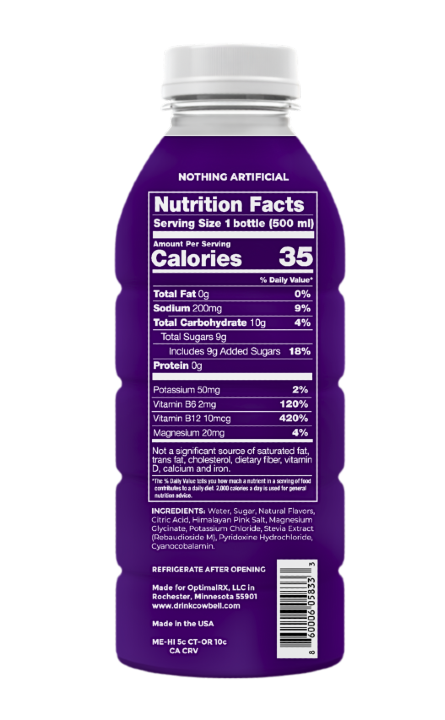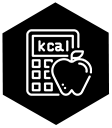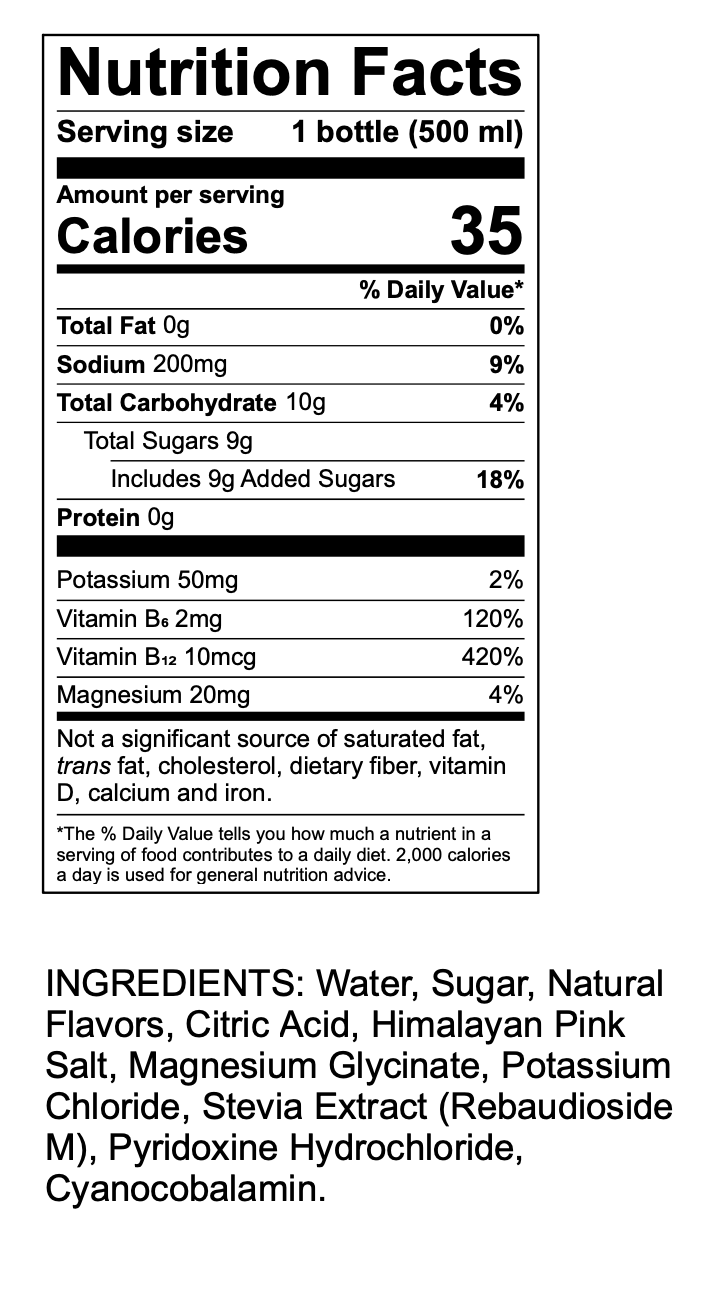why hydration drinks?
Hydration drinks help maintain the balance of water and electrolytes in your body. These are essential for many functions, including transporting nutrients to cells, removing waste, protecting joints, and regulating body temperature. Ensuring proper hydration also helps prevent issues like constipation and kidney stones.
isn’t just water enough?
Plain water may not be enough to stay hydrated because the body needs electrolytes like sodium, potassium, and magnesium to absorb fluids effectively. Drinking only water, especially in large amounts, can dilute these electrolytes, making it harder for the body to retain the fluids. Additionally, plain water tends to pass quickly through the digestive system when not consumed with food or nutrients, which limits its hydrating effect. Hydration drinks that balance water, electrolytes, and carbohydrates can effectively replenish lost fluids and maintain hydration levels.
what makes cowbell hydration's electrolyte ratios unique?
Cowbell Hydration's electrolyte ratios are uniquely crafted to balance performance, health, and taste, setting it apart from typical sports drinks. Each 16.9 fl oz bottle contains 200 mg of sodium, 50 mg of potassium, and 20 mg of magnesium, designed to optimize hydration, muscle function, and recovery. The 4:1 sodium-to-potassium ratio mirrors the needs of active individuals, while magnesium glycinate supports muscle relaxation and energy production. Free from unnecessary additives like excess calcium or phosphorus, Cowbell prioritizes what truly matters, enhanced by natural cane sugar, stevia, and vitamins B6 and B12 for energy and metabolism. This thoughtful formula delivers hydration backed by science, not marketing.
why are sugar and simple carbohydrates included in cowbell hydration?
Sugar and simple carbohydrates are included in Cowbell Hydration drinks to optimize both hydration and energy replenishment, especially during physical activity or recovery. They support the sodium-glucose co-transport mechanism in the small intestine, which enhances the absorption of water and electrolytes, making hydration more efficient than water alone. Additionally, simple carbs provide a quick, digestible energy source to replenish glycogen stores depleted during exercise, preventing fatigue and sustaining performance. This combination not only fuels your body but also helps maintain electrolyte balance, reduce muscle cramps, and support recovery, ensuring you stay hydrated and energized.
why is a 4:1 sodium-to-potassium ratio recommended for effective hydration?
A 4:1 sodium-to-potassium ratio is recommended for effective hydration because it closely mirrors the natural electrolyte loss through sweat, where sodium is lost in greater quantities than potassium. This ratio ensures optimal fluid absorption and distribution, with sodium drawing water into the bloodstream and potassium directing it into the cells, maintaining hydration at all levels. It also helps prevent muscle cramps, fatigue, and imbalances that could affect performance and recovery, while supporting cardiovascular and cognitive functions. By replicating the body's natural processes, this balanced approach promotes sustained energy, efficient recovery, and overall hydration.
what are the common signs of an electrolyte imbalance?
Common signs of electrolyte imbalance include dehydration symptoms like dry mouth, increased thirst, and dark urine, as well as muscle cramps, spasms, or weakness, often linked to low potassium, magnesium, or calcium. Fatigue, persistent weakness, heart irregularities such as arrhythmias, and nervous system issues like confusion or dizziness may also indicate an imbalance. These imbalances can result from factors like excessive sweating, illness, or unbalanced diets. Detection methods include blood and urine tests to measure electrolyte levels and assessing recurring symptoms. Early recognition and addressing these signs can help prevent severe complications and maintain overall health.
how much sodium do you need to stay properly hydrated during exercise?
The amount of sodium you need to stay hydrated during exercise depends on factors like sweat rate, workout intensity, duration, and environmental conditions. For short workouts under an hour, 200–300 mg of sodium may suffice, while moderate sessions of 1–3 hours typically require 300–600 mg per hour. Endurance activities lasting over three hours in hot or humid conditions may necessitate 500–1,000 mg per hour. Sodium plays a critical role in regulating fluid balance, preventing muscle cramps, and avoiding conditions like hyponatremia caused by excessive water intake without adequate sodium. To optimize hydration, start replenishing sodium early in your workout and pair it with fluids for efficient absorption.
what makes cowbell's electrolyte ratios ideal for performance & recovery??
Cowbell Hydration’s electrolyte ratios are scientifically crafted to optimize performance and recovery by balancing sodium, potassium, and magnesium. Each 16.9 oz bottle contains 200 mg of sodium to replenish sweat losses, 50 mg of potassium to regulate fluid balance and support muscle function, and 20 mg of magnesium to aid in muscle relaxation, energy production, and recovery. This 4:1 sodium-to-potassium ratio mirrors the body’s natural needs during physical activity, ensuring hydration and energy metabolism are sustained. Enhanced with vitamins B6 and B12, natural flavors, and low-calorie sweetness from cane sugar and stevia, Cowbell Hydration delivers effective, clean hydration without unnecessary additives, supporting athletes and fitness enthusiasts in achieving peak performance.

























